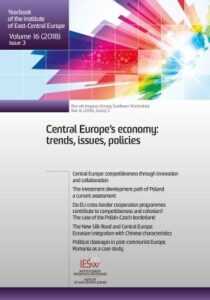Pages: 147-164
Edition: Lublin 2018
DOI: --
Citation method: Cristina Matiuta, ‘Political cleavages in post-communist Europe. Romania as a case study’, Yearbook of the Institute of East-Central Europe, Vol. 16, No. 3, 2018, pp. 147-164.
Abstract:
The concept of cleavage, as it was theorized by Stein Rokkan in the late 1960s, sends to a deep and lasting division between groups, based on a certain type of conflict. It links the individual behaviour to macro-historical processes that will shape the political field for decades. A controversial issue is the application of the Western Europe-specific cleavages, where national and industrial revolutions have produced profound transformations with a lasting impact on party systems, outside this area. By focusing on the Romanian case, the paper explores the cleavages before the establishment of communism and those emerged after its collapse, results of this regime and/or of the process of transition to democracy. The adopted perspective is to use Rokkan’s typology as a reference point, to analyze the extent to which it has descriptive capacity for the Romanian space, and even if losing the rigor of definition, to refer to the tensions and divisions which, although not necessarily leading to the emergence of political parties, have the potential to shape the political action.
Bibliography:
Bartolini, S. and Mair, P., Identity, competition, and electoral availability. The stabilization of European electorates 1885-1985, Cambridge and New York: Cambridge University Press, 1990.
Barbu, D., Republica absentă. Politică și societate în România postcomunistă [The Absent Republic. Politics and Society in Post-communist Romania], Bucharest: Nemira, 1999.
Bărbulescu, M., Deletant, D., Hitchins, K., Papacostea, Ș., Teodor, P., Istoria României [The History of Romania], Bucharest: Editura Enciclopedică, 1998.
Bell, D., The Coming of Post-industrial Society, New York: Basic Books, 1973.
Bornschier, S., ‘Cleavage Politics in Old and New Democracies’, Living Reviews in Democracy, 2009, https://www.ethz.ch/content/dam/ethz/specialinterest/gess/cis/cisdam/CIS_DAM_2015/WorkingPapers/Living_Reviews_Democracy/Bornschier.pdf [2018-05-04].
Coposu, C., Confesiuni. Dialoguri cu Doina Alexandru [Confesions. Dialogues with Doina Alexandru], second edition, Bucharest: Vremea Publishing House, 2014.
Deletant, D., ‘Confruntarea cu trecutul comunist. Democrația și lustrația în România’ [Confronting the communist past. Democracy and lustration in Romania], Revista 22, 24 September 2008, https://www.revista22.ro/confruntarea-cu-trecutul-comunist-brdemocratia-si-lustratia-in-romania-4837.html [2018-06-06].
De Waele, J.-M., ‘Consolidation démocratique, partis et clivages en Europe centrale et orientale’, in: J.-M. De Waele (ed.), Parties politiques et démocratie en Europe centrale et orientale, Bruxelles: Editions de l’Université de Bruxelles, 2002, pp. 145-161.
Lipset, S.M. and Rokkan, S., ‘Cleavage Structures, Party Systems, and Voter Alignments: An Introduction’, in: S.M. Lipset and S. Rokkan (eds), Party Systems and Voter Alignments, New York and London: The Free Press-Collier-Macmillan, 1967, pp. 1-64.
Duverger, M., Les partis politiques, Paris: Armand Colin, 9ème édition, 1976.
Michnik, A., From Velvet Revolution to Velvet Dictatorship. Reflections on Democratic Regression, 2018, http://www.publicseminar.org/2018/05/from-velvet-revolution-to-velvet-dictatorship/ [2018-06-26].
Preda, C. and Soare, S., Regimul, Partidele și Sitemul Politic din România [The Regime, the Parties and the Political System from Romania], Bucharest: Nemira, 2008.
Preda, R., ‘Ortodoxia și democrația postcomunistă. Cazul românesc’ [Orthodoxy and post-communist democracy. The Romanian case], in: C. Ungureanu (ed.), Religia în democrație. O dilemă a modernității [Religion in democracy. A dilemma of modernity], Iași: Polirom, 2011.
Rokkan, S., Citizens, Elections, Parties. Approaches to the Comparative Study of the Processes of Development, Oslo: Universitetsforlaget, 1970.
Seiler, D.L., Les Partis Politques en Europe, Paris: Presses Universitaires de France, 1978.
Seiler, D.L., ‘Peut-on appliquer les clivages de Rokkan a l’Europe Centrale?’, in: J.-M. De Waele (ed.), Parties politiques et démocratie en Europe centrale et orientale, Bruxelles: Editions de l’Université de Bruxelles, 2002, pp. 115-144.
Vaida, O., ‘Clivaje politice în România post-comunistă’ [Political cleavages in post-communist Romania], Sfera Politicii [The Sphere of Politics], nr. 123-124/2006.
Whitefield, S., ‘Political Cleavages and Post-Communist Politics’, Annual Review of Political Science, 2002, http://polisci.annualreviews.org [2018-05-16].

PDF: Download